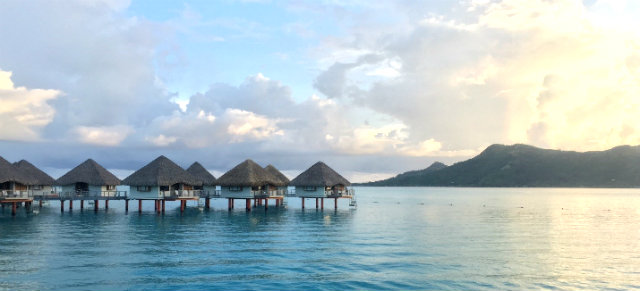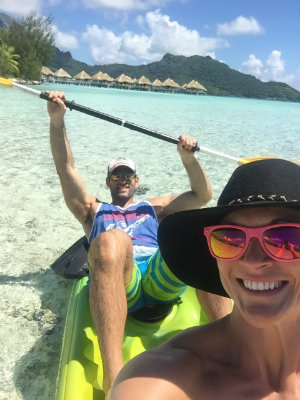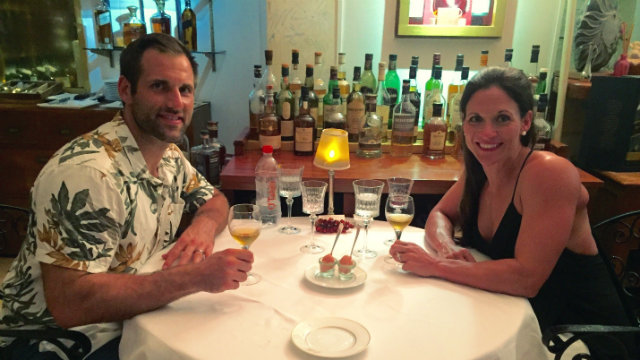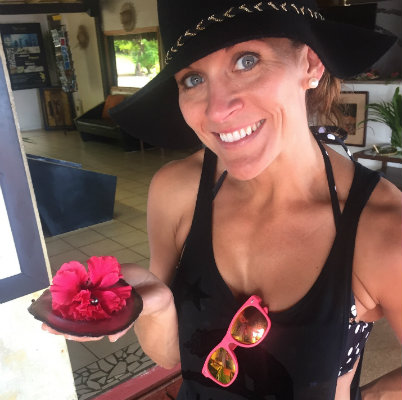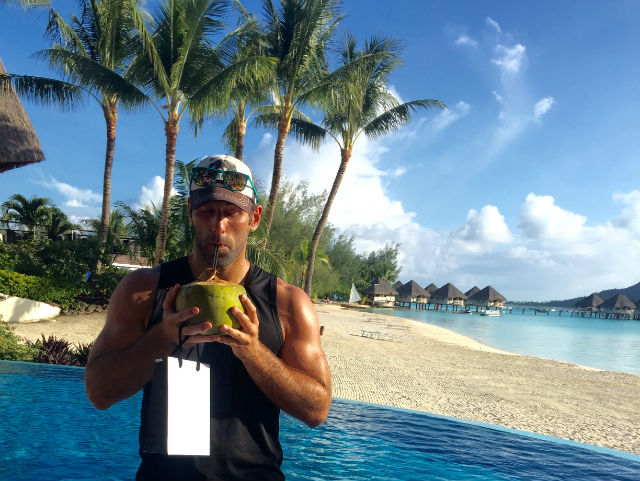 Reading Time: 7 minutes
Reading Time: 7 minutesWeddings and stress go together like babies and dirty diapers. It’s the happiest day of your lives, but everything that leads up to that day can be a big mess. The pre-engagement period is just the beginning—the stress of hiding the big surprise and the anxiety of finding the perfect ring that fits as you pop the question, not to mention waiting to hear her say, “Yes”! And once you know that ring fits, I recommend you immediately go buy stock in Pfizer. Your wedding to-do list will be longer than Homer’s The Odyssey and Iliad combined, and you’re going to need a year’s supply of Advil—for the first month.
But don’t worry, the headache you endure for the year of planning your wedding, inviting all the guests, and meticulously checking to ensure your big day runs smoothly will pass. And then, just around the corner, your honeymoon will be in sight.
According to The Wedding Report, 99% of all people who choose to get married, go on a honeymoon. After the events I just described, who can blame them? Flying to Bora Bora to spend time with your forever person and staying in an overwater bungalow isn’t as bad as everyone may think. Of course, this takes the courage to avoid procrastination and research your desired destination about eight months before your wedding day.
In an article in the Harvard Business Review, research done by Shawn Achor and Michelle Gielan from the Institute of Applied Positive Research suggests that most of the happiness gleaned from a vacation is dependent upon the stress level of the vacation. We all understand the balancing nature of the Yin, representing serenity, and the Yang, representing chaos. Your honeymoon needs to be the Yin to your wedding Yang. Decreasing the anxiety experienced during the honeymoon will likely result with you gaining a positive benefit from the time off.
You may still be worried since you’re typically more stressed when you return from vacations than before you left. Luckily for you and my wife, I am a stubborn German who insists on weeks of research and have paved the road for you with tips and tricks to ensure honeymoon bliss.
Tip 1: Research, Research, Research
Start by crossing something off your bucket list and making a list of your top three must-see places. But don’t wait to start planning your honeymoon. Remember that poorly planned and stressful vacations eliminate the positive benefit of time away. As our good friend Ben Franklin said, “If you fail to plan, you are planning to fail.”
It seems as if most women grow up fantasizing about their dream weddings, but my wife is not most women. She was the girl who dreamed of her honeymoon and hoped that one day she would stay in an overwater, glass-bottom bungalow with her new husband (me). Fellas, when your wife gives you a slam dunk idea like mine did for our honeymoon, you take it.
After you arrive at your wife’s desired destination, relax and take it all in. Up until this point, your days have been packed with activities, so try not to plan an excursion the minute after your arrival. In the Journal of Happiness Studies, Bloom and colleagues found that effective vacations give you the choice and freedom to choose what you want to do. The simple goal of a honeymoon should be restoration – physically, emotionally, mentally, and spiritually. For my wife and I, that meant exercising and not trying to do much.
Tip 2: Avoid Permanent Plans
That means two things:
- Plan on going somewhere that has multiple options to pick from depending on the weather, your level of energy, or your budget.
- Try to avoid structuring your vacation around an unbreakable schedule. Your strategy should be to choose something you find truly replenishing in that moment.
If you aren’t familiar with French Polynesia, it is composed of 118 geographically dispersed islands and atolls stretching over an expanse of more than 2,000 kilometers in the South Pacific Ocean. During our six-night stay, we kept a list of our top three “must do” activities, and anything else we did was considered icing on the cake.
We rented a very small electric vehicle and drove the circumference of the island. We saw wild dogs and chickens roaming the streets in the main town of Vaitape, and pearl farms teeming with beautiful black pearls. We also had the chance to eat food from a local food truck and buy groceries to take back to our bungalow. But our dinner reservation at La Villa Mahana was the meal of a lifetime. We sat at one of six tables inside of the chef’s home and enjoyed freshly caught fish, a specially prepared chocolate lava cake, and wine pairings for each of the six courses. If you ever get the chance to visit Bora Bora, this place is a must. However, this masterful dinner only landed on the number two spot on our list.
Drum roll, please. Our number one experience while on our honeymoon was — diving with sharks and sting rays. There were no cages or protective gear, just us and them swimming freely in the South Pacific. These beautiful beasts swam gracefully beneath our feet while we and the other bait took videos and selfies with our GoPros. Most of you are probably thinking there is no way you would ever share the ocean with ten-foot sharks but swim with me for a minute: any kind of thrill seeking activity like bungee jumping or diving with sharks will raise your endorphin levels by 200%. Think about it, the brain chemical that delivers our feelings of euphoria and help regulate the release of sex hormones is increased by 200%.
Tip 3: Be Actively Romantic
You don’t always have to swim with sharks or sky dive. The smell of roses, a beautiful sunset, and hugs and kisses all make us happy by way of endorphins, too. Frequent pleasurable experiences can help maintain a consistent elevated mood and may earn you and your partner extra time beneath the sheets.
Tip 4: Plan Your Re-Entry
After the romantic dinners, aquatic adventures, and island excursions, the time will come to head back to the “sharks” waiting for you at home. Plan ahead so you can avoid work pile-up and an immediate return to routine. You will have discharged a lot of work- and wedding-related anxiety during your trip and the last thing you should do is dive head first back into the shark tank.
I am a strength coach at our local university and work with close to 400+ athletes and my wife is a physical therapist who had eight to nine hours of patients waiting for her the day after we returned home. Both my wife and I made sure to have all of our exercise programs written and a clean house waiting for us so we didn’t have to scramble the day we arrived home.
I also cooked for my wife that evening and took her on our “first date” as a newly married couple. This slow re-entry back into our routine allowed us to avoid the shark bites typically felt during the post-honeymoon period.
Enjoy Your Stress-Free Honeymoon
If anxiety does start to creep in again and you feel the need to get away, then it’s time to reference back to the Journal of Happiness Studies I mentioned earlier. They suggest taking a vacation every three to six months to alleviate stress. So, if your next vacation is coming up sooner than later, remember these four trip tips: research, avoid permanent plans, be actively romantic, and plan your re-entry because every once in a while you’re going to have to balance sharks with bungalows.
References:
1. Bloom, Jessica De, Sabine A. E. Geurts, and Michiel A. J. Kompier. “Vacation (after-) Effects on Employee Health and Well-being, and the Role of Vacation Activities, Experiences and Sleep.” Journal of Happiness Studies J Happiness Stud 14, no. 2 (2012): 613-33. doi:10.1007/s10902-012-9345-3.
2. “French Polynesia.” Wikipedia. Accessed May 03, 2016.
3. “HARVARD BUSINESS REVIEW: When a Vacation Reduces Stress – And When It Doesn’t.” Goodthink Inc. Accessed May 03, 2016.


